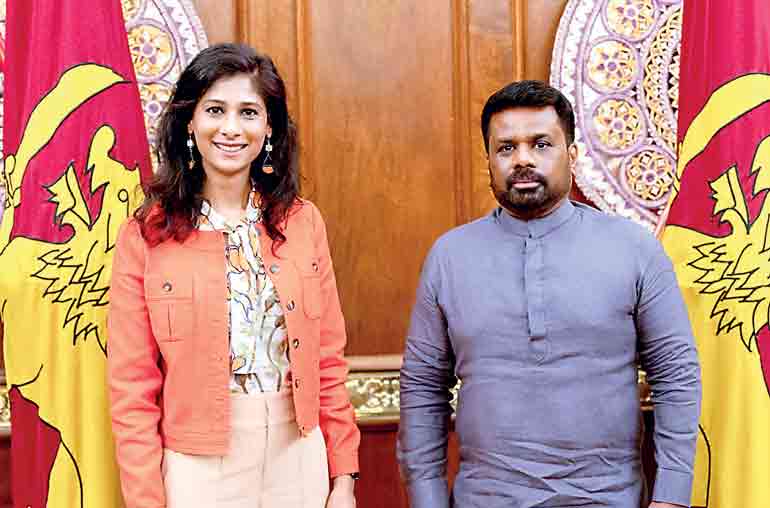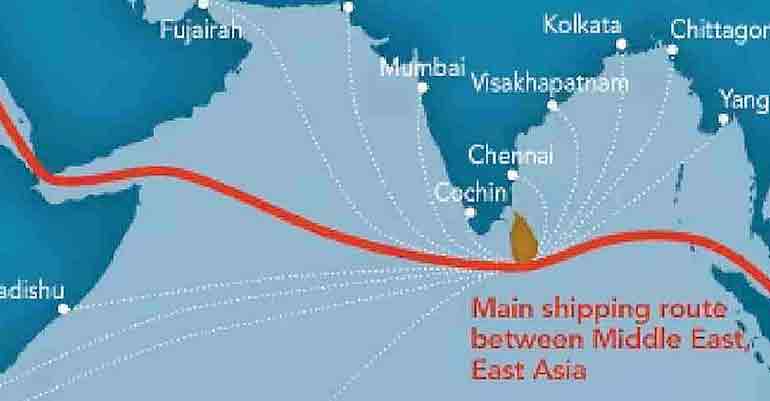Sunday Feb 22, 2026
Sunday Feb 22, 2026
Tuesday, 24 June 2025 02:29 - - {{hitsCtrl.values.hits}}

International Monetary Fund First Deputy Managing Director Dr. Gita Gopinath emphasised in Sri Lanka this week that the country must stay the course on reforms
By Dinesh Weerakkody
The International Chamber of Commerce (ICC), (ICC is represented in Sri Lanka by ICCSL) the world’s largest business organisation representing 45 million companies across 170+ countries, has warned of the serious risks posed by tariff retaliation and advocates for a stable, open global trading system. Against this backdrop, Sri Lanka’s journey from 2025 to 2030 stands as a critical inflection point as it charts its course from economic recovery to sustainable growth.
Emerging from a severe crisis, the nation faces pivotal opportunities and challenges that will reshape its global standing. This pivotal moment coincides with the G7’s and G 20s recalibration of global engagement, driven by intensified US-China competition. Their push for economic “de-risking” and sustainable supply chains is deepening the formation of new regional economic blocs. For the Sri Lankan private sector, this geopolitical shift in business relationships presents tangible strategic openings to enhance its relevance on the global stage and become profitable MNCs.
Strategic location
Sri Lanka’s strategic location, supported by deep-water ports in Colombo and potentially Trincomalee, a well-educated workforce, and multiple free trade agreements with countries such as India, Thailand and Singapore—and possibly with China and Vietnam —makes it an attractive destination for logistics and manufacturing investment. These advantages position the country as a potential Indo-Pacific hub for economic activity. To fully harness this potential, Sri Lanka must promote sectors such as high-value apparel, electronics assembly, pharmaceuticals, shipping, tourism and logistics services and BPO services.
Opportunity
However, policy consistency, improvements in port and energy infrastructure, and a stable business environment will be crucial. Additionally, Sri Lanka’s potential role in the India–Middle East Economic Corridor could further enhance its strategic and economic significance. In parallel, Sri Lanka must develop a transparent, efficient, and environmentally responsible regulatory framework for its emerging critical minerals sector. Aligning exploration and extraction activities with international environmental, social, and governance (ESG) standards is essential. Proactively seeking investment, while also promoting in-country value addition such as mineral processing, will strengthen Sri Lanka’s position as a reliable and ethical supplier of critical minerals for global manufacturing.

Sri Lanka sits directly along a busy East–West commercial route in the Indian Ocean, with around 60,000 vessels annually—that’s approximately 164 ships per day on average (.reddit.com)
IMF’s EFF
The visit of Dr. Gita Gopinath few weeks after the visit of the World Bank President Banga signifies the importance given to the ongoing efforts for the successful completion of the IMF Extended Fund Facility, along with the implementation of deep structural reforms—including the restructuring of state-owned enterprises, trade liberalisation, and improved public sector governance. This is vital to restore confidence in the economy. These reforms including labour reforms are not only central to achieving macroeconomic stability but are also key prerequisites for attracting meaningful long and medium-term foreign investment.
GSP+
The renewal of the EU’s GSP+ trade preference scheme is another immediate priority. Given its importance to Sri Lanka’s apparel sector, demonstrating sustained commitment to labour rights, human rights, and environmental standards will not only help secure GSP+ but also pave the way for new and more robust trade arrangements with other advanced economies.
Manufacturing hub for the region
Following recent global realignments post tariffs, many multinational companies are actively seeking alternative locations for BPO/KPO services and light manufacturing that are insulated from geopolitical risk. Sri Lanka, if it succeeds in restoring economic stability and investor confidence, can offer a compelling value proposition for these big companies, particularly in the areas of value-added manufacturing and e-services.
Ports and shipping
Ports remain among Sri Lanka’s most valuable assets. The Hambantota Port needs to expand its operations , the commercially sound development of the West Container Terminal in Colombo—through a joint venture between Adani and John Keells—and potential developments in Trincomalee with Indian collaboration represent positive models for future investment to expand capacity. To attract such strategic partnerships, Sri Lanka must clearly signal its support for a Free and Open Indo-Pacific and ensure all port-related initiatives uphold the principles of transparency, financial sustainability, and respect for national sovereignty.
Green financing
Sri Lanka must also position itself as a regional leader in green finance and climate-resilient development initiatives for the region including energy exports. The country has significant potential in offshore wind and solar energy power grid modernisation, and climate adaptation projects. Developing bankable initiatives by Banks with the support of the regulators in these sectors and engaging with institutions such as the U.S. Development Finance Corporation, Deutsche Bank, EXIM Bank, ADB, UNESCAP and leading climate funds will be essential. Sri Lanka can further enhance its global standing by serving as a hotspot for innovative, R&D and climate-resilient technologies using Sri Lankan talent.
Conclusion
The period from 2025 to 2030 represents a decisive turning point for Sri Lanka. By leveraging its geographic advantages, human capital, tourism potential, and natural resources—alongside sustained economic reforms and transparent governance—the country can transform existing vulnerabilities into enduring strengths. This economic transformation demands unified, decisive action and collaboration across all sectors to rebuild investor confidence and forge strong, lasting international partnerships. Seizing this moment requires relentless effort, collaboration, expertise, commitment, and disciplined leadership from both the private and public sectors. The critical question is: Are we ready to meet this challenge?
References: